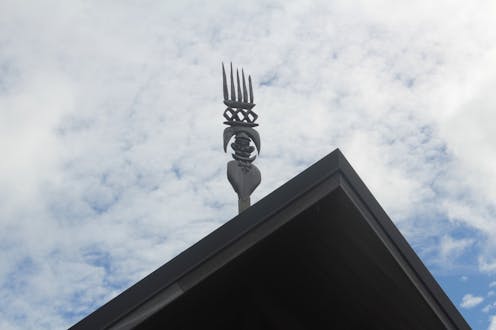New Caledonia has had an indigenous body advise government since 1999. What can Australia learn?
- Written by Eddie Wayuone Wadrawane, Associate Lecturer, Université de Nouvelle Calédonie

As Australia prepares to vote in a referendum on an Aboriginal and Torres Strait Islander Voice to parliament later this year, what can we learn from similar models in our region?
New Zealand’s Waitangi Tribunal[1] was established in 1975 as a “permanent commission of inquiry” on issues affecting Māori people. Despite resulting from a treaty, it has no powers to veto legislation[2].
We can also look to New Caledonia, a French territory northeast of Australia. It has its own version of a Voice to parliament, called the Customary Senate, which represents Kanaks, the territory’s First Peoples and its largest ethnic group at over 40%[3].
The Customary Senate must be consulted by the territorial authorities on issues relating to Kanak identity, particularly in matters of customary civil status, and customary lands.
The Customary Senate, which has been sitting for more than 20 years, shows us a First Nations consultative body doesn’t pose a “threat” to democracy or the rule of law.
So how does it work?
The Customary Senate
New Caledonia has a unique government. It has a hierarchy of governance from French institutions in Paris, its own government with a Congress that sits in the capital Nouméa, as well as three provincial assemblies and local authorities.
There are differing views on moving to full independence from France. The 1998 Nouméa Accord signed with France, and included in the French Constitution, provided a timetable for independence. Three referendums have since been conducted, none of which has produced a vote in favour of independence – although the most recent referendum in 2021 was boycotted by most independence supporters[4].
The Customary Senate was established under the Nouméa Accord, and it first sat[5] in 1999. It’s one institution in a long political process to recognise custom as the foundation of Kanak society. This means respecting cultural traditions, many of which date back more than 3,000 years, and norms of social behaviour that prioritise[6] clan duties and values, and hierarchies based on generations over individuals. This is all different from French law.
The Senate is an advisory body composed of representatives from each of the eight customary areas of the archipelago.
Members are appointed for five-year terms, most recently in 2020, and the president rotates[7] yearly between the customary areas. Candidates are nominated by local customary councils, which are the direct representatives of the customary world.
The Customary Senate must be consulted by the president of the New Caledonian government and the Congress, the presidents of the three provinces, or the French High Commissioner, on issues related to Kanak identity, custom and society.
It receives bills concerning such issues, and has two months to deliberate, with additional procedures in the case of disagreement.
But the Congress, not the Customary Senate, has ultimate authority under law.
Read more: Why New Caledonia's instability is not just a problem for France[8]
In 2014, the Customary Senate published a Charter of the Kanak People[9] aimed at structuring and formalising an alternative to French administrative organisation, and to promote Kanak values. Although this charter lacks legal status, it inspires legal proceedings and judgements. Across the archipelago, those of Kanak origin are governed in matters of civil law by their customs. Disputes that end up in court, for example, have customary assessors present who advise and assist legal representatives.
The name “Customary Senate” is not trivial in a territory still subject to French republican law. Indeed, some feel there’s an unrealised political project for it to become a second chamber of government, as exists in Paris or Canberra. In March this year, the Senate created[10] an Indigenous discussion forum to debate the end of the Nouméa Accord.
Resolution of the complex debates surrounding the governance of New Caledonia will decide the Customary Senate’s future. Questions of First Nations sovereignty and independence currently remain unresolved.
Independence supporters have a political majority in two out of three provinces[11], and strong representation and leadership in the Congress. The president of the Congress is from a pro-independence party, and the president of the current government, Louis Mapou from the Party of Kanak Liberation, also supports independence.
Implications
As Kanak society changes over time, the Customary Senate could also play a role in the adjustment of customary norms, particularly in regard to the place of women in society. It’s already a meeting-place between Kanak clan-based customary consensus and Western democracy, according to its current director of culture, Louis Waia. Discussions are needed to open the Customary Senate to women and younger people, both urban and rural. At present, only (older) men serve in the Senate.
Australian Minister for Foreign Affairs Penny Wong visited New Caledonia[12] in April this year, attending the Customary Senate and the Congress[13].
She said in 2022 that she’s “determined to see First Nations perspectives at the heart of Australian foreign policy”, and has now appointed[14] an Ambassador for First Nations People.
The minister is aware of New Caledonia’s system of political representation and how independence supporters have recently received a negative[15] reception from the Macron government in negotiations in Paris. Officially, Australia remains neutral on these disputed governance arrangements[16].
Nonetheless, the Australian Voice to parliament campaign can learn from, and support, these struggles taking place in its multicultural Pacific neighbour.
References
- ^ Waitangi Tribunal (www.waitangitribunal.govt.nz)
- ^ no powers to veto legislation (theconversation.com)
- ^ over 40% (www.iwgia.org)
- ^ boycotted by most independence supporters (www.theguardian.com)
- ^ first sat (www.dfat.gov.au)
- ^ prioritise (unc.nc)
- ^ rotates (la1ere.francetvinfo.fr)
- ^ Why New Caledonia's instability is not just a problem for France (theconversation.com)
- ^ Charter of the Kanak People (www.senat-coutumier.nc)
- ^ created (la1ere.francetvinfo.fr)
- ^ provinces (www.newcaledonia-business.com)
- ^ visited New Caledonia (pina.com.fj)
- ^ and the Congress (www.foreignminister.gov.au)
- ^ appointed (www.dfat.gov.au)
- ^ negative (www.lowyinstitute.org)
- ^ disputed governance arrangements (la1ere.francetvinfo.fr)

















